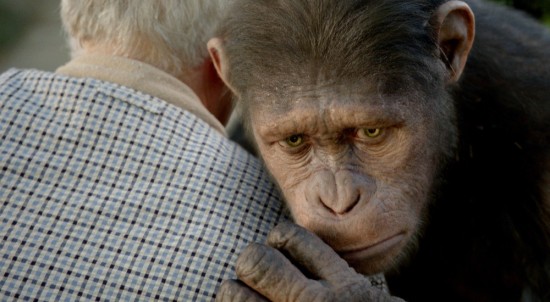
Full disclosure: I have an aversion to apes. I simply don’t like them. I have never seen a Planet of the Apes film, so this is a new experience for me. In the age of The Simpsons it’s hard not to have a base familiarity with the series, though, so I think I knew enough going in to make a reasoned judgment.
I had a healthy scepticism for all of the early promos for this film. It wasn’t until the last trailer was released that I was willing to give it a chance. In the end, James Franco delivers on his promise with all of his limbs intact.
Will Rodman (James Franco) is trying to cure Alzheimer’s. His test subject, an ape, shows increased intelligence. After a lab mishap, he adopts the smart ape’s son, Caesar (Andy Serkis), and makes a study of him. Inevitably they are separated and the apes unionise so that they may make for the forest and get away from it all; hairy Henry David Thoreaus, the lot of them.
The story of Franco's tortured relationship with his father (a surprisingly affecting John Lithgow) fairly quickly gives way to the story of Caesar’s struggle for a sense of identity. The humans become little more than window dressing by the end, with the film effectively conquered by the apes.
Everyone in cinema knows that your go-to ape is Andy Serkis. He and some other mo-cap actors successfully bring their apes to life without investing in them the loathsome qualities of your traditional ape (I have prejudices, okay?).
There are long stretches of the film consisting of non-verbal ape interaction, and they work surprisingly well. The animators have made the important apes distinguishable enough that their characters manage to emerge naturally, and the orangutan in particular is great.
Humans aren't strictly injected with villainy, and the apes aren’t purely malevolent (except for the obviously evil one), so once Malfoy (Tom Felton, being traditionally jerkish) is out of the way a lot of the tension dissipates. Most of the promotional material suggests that apes are going to ransack cities but the film itself is reasonably more nuanced than that; I suspect it may be a little too grey for some audiences.
Not mine, though: I saw Rise of the Planet of the Apes with a veritable audience of yahoos, who made clear their astonishment at all times – including reveals that were blatantly in the trailer. They must have really connected with the plight of these apes. By minimising human involvement outside of their capacity of enablers, the audience is able to cheer the apes on as they lead to their inevitable (and advertised) stand. Rupert Wyatt manages an amazing balancing act of making Caesar both endearing and sinister, endowing him with a certain nobility tempered by quasi-righteous brutality.
I was pretty positive on this whole experience until I saw that they are, inevitably, planning sequels. I realise that this was all set up, but what we're going to get is essentially a third version of the Apes franchise, after the non-starter that was Tim Burton's presumably godawful 2001 effort. How many Doctor Zaiuses do you people need before you're satisfied? The concept of the next film sounds inherently flawed, and I don't know how I can get behind it. That said, Wyatt has made a good argument that a film can be carried upon the shoulders of apes, and maybe I should just go on the long march of capitalism – but then humanity truly will have won.

